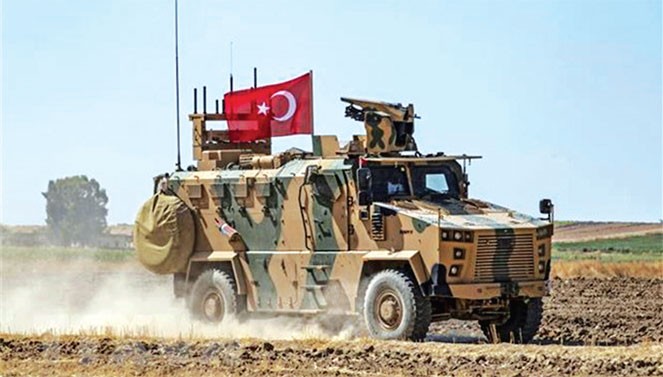(VOVWORLD) - The world has seen fighting between the Turkish Army and the Kurds in northeastern Syria over the past few days, after the US withdrew its troops from the region. Although Turkish leaders insisted that the offensive, dubbed Operation Peace Spring, will not penetrate more than 30km into Syrian territory, there is concern that a full-scale war is imminent.
 A Turkish military vehicle joins an attack in Syria (Photo: VNA) A Turkish military vehicle joins an attack in Syria (Photo: VNA)
|
The Kurds in northern Syria, specifically the YPG force, represent a conflict of interests between the US and Turkey. Turkey wants to eliminate the YPG who it believes is backing the outlawed PKK Party. By smashing the YPG, Turkey hopes to destroy the will of the Kurds in Turkey, Syria, Iraq, and Iran to demand their own independent and sovereign state.
Worries
The Turkish military operation against the Kurds was no surprise. Turkey has twice before deployed troops to Syria to suppress the YPG force. The US troop pull-out opened up a big opportunity for Turkey to conduct its third military campaign against the Kurds in Syria.
With the new offensive, Turkey wants to establish a 32km by 480km buffer zone in Syrian territory to safeguard its own security. In this safe corridor, Ankara plans to relocate some 1 million of the 3.6 million Syrian refugees in Turkey.
Analysts say the Operation Peace Spring is a reminder of President Recep Tayyip Erdogan’s ambition of increasing Ankara’s influence in Syria and its role in the region.
But this ambitious plan will have a tragic consequences. According to Germany’s DW news, Turkey’s campaign is killing people and causing potential instability in the Middle East for the years to come.
The Kurds in Syria say Turkey wants ethnic cleansing and a rearrangement of the population along the border. There are an estimated 1.8 million Kurds in Syria and half of them live in the proposed buffer zone.
It is feared that 11,000 IS prisoners could escape if chaos occurs, enabling a revival of IS terrorist groups. The Syrian Democratic Force, which includes the YPG force, is still fighting IS remnants. The force retook the last IS stronghold early this year. Kurd leaders in Syria warn that the SDF might lose control of the IS prisoners in the instability caused by the Turkish invasion.
The military offensive is displacing hundreds of thousands of people from SDF-controlled areas of Syria and the Kurds area of Iraq. Sectarian tensions will worsen and Ankara will have to deal with a prolonged insurgency by the Kurds.
No sign of ending
The world has loudly condemned this Turkish military operation. After the closed-door UN Security Council meeting on Thursday, 5 European countries, including France, Germany, the UK, Belgium, and Poland, issued a joint statement, calling on Turkey to halt its military activities in the offensive against the Kurds in Syria.
Ankara has threatened to send millions of Syrian refugees to Europe if Europe continues to call its campaign an invasion. Turkish leaders are defending their operation by saying they are protecting themselves and the Syrians from the Kurds, who they consider terrorists.